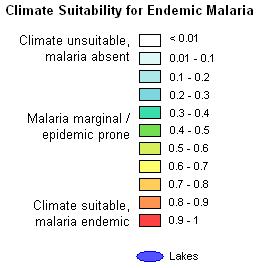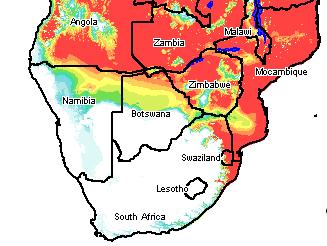For a nation that enjoys spending time outdoors and travelling into the bushveld, many South Africans are worryingly lax about protecting themselves from malaria, says Health24's Travel Expert.
On World Malaria Day, 25 April 2012, Health24's Travel Expert, Dr Peter Vincent of Netcare Travel Clinics and Medicross Tokai Family Medical Centre, cautions that this is a huge mistake.
The South African National Department of Health Malaria Control Programme reported the number of cases in January 2012 as 2267 with 16 deaths, and in February 2012 as 968 cases with 10 deaths.
A total of 67% of February cases came from the endemic regions of KwaZulu-Natal, Mpumalanga and Limpopo, while 31% came from Gauteng, mainly in travellers.
New research indicates that worldwide, malaria kills approximately 1.2 million people annually, double the number that was previously ascribed to malaria deaths. The study was conducted by the Institute of Health Metrics and Evaluation in Seattle, Washington in the United States of America.
Don't assume you're safe
According to Dr Vincent, malaria is on the whole more of a threat to those individuals who are not aware of the dangers of the disease or how to protect themselves from it.
However, South Africans living in malaria areas and travellers to such areas should not assume that they are safe in their knowledge of malaria as they may have misconceptions about it.
“While most people are aware that malaria is a serious illness, many individuals mistakenly believe that taking prophylaxis is a good enough protective measure. In fact, none of the preventative medications available — doxycycline, mefloquine and atovaquone/proguanil — offer complete protection against malaria,” says Dr Vincent.
“Having said that, prophylactic medications most certainly do provide a large measure of protection and could well save your life, so be sure to take them if they have been recommended by your doctor, pharmacist or travel clinic,” he adds.
“It is a myth that prophylaxis does not provide protection against the development of cerebral malaria. It is also untrue that prophylaxis makes diagnosis of malaria more difficult, as is sometimes rumoured.”
Dr Vincent says certain patients have told him that they have visited malaria areas more than once without prophylaxis and have never contracted malaria. “This is not to be recommended, however, as malaria can be a very dangerous disease if not diagnosed early. Even if you do get bitten by an infected mosquito, prophylaxis is almost certainly going to help to reduce the severity of the symptoms.”
Don't get bitten in the first place!
When travelling to a malaria area it is important to take the prescribed medication that is right for you. However, the best way to prevent malaria is to avoid being bitten by mosquitoes in the first place.
“This cannot be overemphasised,” says Dr Vincent. “Remember that the malaria mosquito is a dusk to dawn feeder and even if you are taking prophylaxis you should change into long sleeved shirts and blouses and long pants for the evening sun-downers. Also use insect repellents containing DEET on all areas of the skin that are exposed and sleep under mosquito nets.”
“Those who suspect they may have malaria should seek immediate medical assistance. Any flu-like symptoms on your return and for the next three to six months should be regarded as possible malaria and requires an urgent blood test and appropriate action,” concludes Dr Vincent.
How you can help
Although new treatments and even a vaccine are in development, pesticide-impregnated mosquito nets remain the most cost-effective and practical means of saving lives from malaria in Africa.
You can strike a potent blow against malaria by purchasing a bead bracelet (R30) from any branch of Cape Union Mart and Old Khaki stores. This joint initiative by United Against Malaria and Relate, a South African non-profit that creates and sells beaded cause bracelets, has sold 500 000 bracelets to raise funds for the fight against malaria in sub-Saharan Africa.
The bracelets also develop skills, create employment and generate income for the people in Cape Town townships who make them, including senior citizens with orphaned grandchildren in their care, unemployed young adults, the mentally and physically challenged, and refugees seeking asylum in South Africa.
- Adapted by Olivia Rose-Innes for Health24 from press releases issued by Netcare Travel Clinics and Relate, April 2012.
Post a question to the Travel Expert
Read more: Africa's deadliest beast




 Publications
Publications
 Partners
Partners















